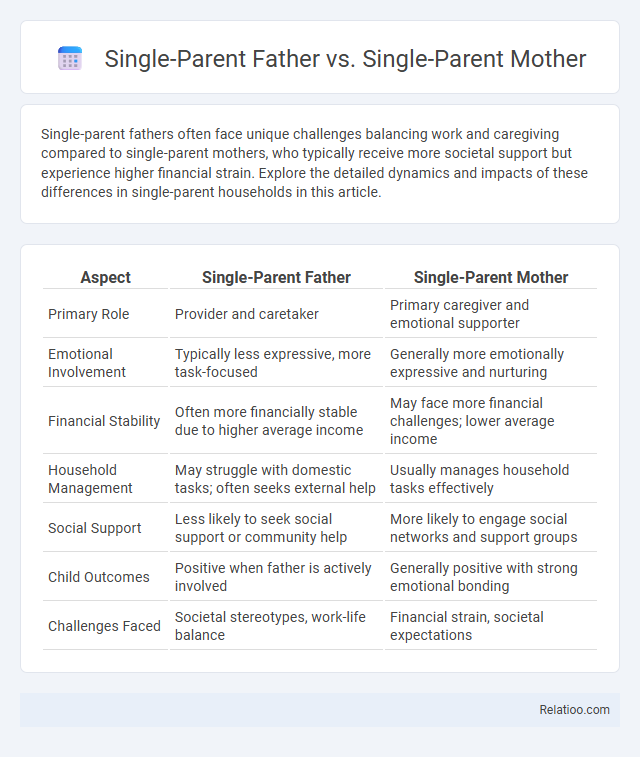Single-parent fathers often face unique challenges balancing work and caregiving compared to single-parent mothers, who typically receive more societal support but experience higher financial strain. Explore the detailed dynamics and impacts of these differences in single-parent households in this article.
Table of Comparison
| Aspect | Single-Parent Father | Single-Parent Mother |
|---|---|---|
| Primary Role | Provider and caretaker | Primary caregiver and emotional supporter |
| Emotional Involvement | Typically less expressive, more task-focused | Generally more emotionally expressive and nurturing |
| Financial Stability | Often more financially stable due to higher average income | May face more financial challenges; lower average income |
| Household Management | May struggle with domestic tasks; often seeks external help | Usually manages household tasks effectively |
| Social Support | Less likely to seek social support or community help | More likely to engage social networks and support groups |
| Child Outcomes | Positive when father is actively involved | Generally positive with strong emotional bonding |
| Challenges Faced | Societal stereotypes, work-life balance | Financial strain, societal expectations |
Understanding Single-Parenthood: Fathers vs Mothers
Single-parent families often face unique challenges, with fathers and mothers experiencing single parenthood differently due to societal roles and expectations. Fathers may encounter less social support and increased pressure to fulfill financial responsibilities, while mothers typically manage a wider range of caregiving and emotional tasks, influencing your approach to parenting strategies. Recognizing these differences enhances understanding of resource allocation and community support tailored to each single-parent household type.
Common Challenges Faced by Single-Parent Fathers
Single-parent fathers often encounter challenges such as balancing work responsibilities with caregiving duties, societal stereotypes that question their parenting abilities, and limited access to support networks compared to single mothers. Your experience may also include managing emotional stress while striving to provide financial stability and maintaining positive relationships with children. Understanding these common obstacles highlights the need for tailored resources that address the unique struggles faced by single-parent fathers within the broader single-parent family dynamic.
Unique Struggles of Single-Parent Mothers
Single-parent mothers often face unique struggles including financial instability, balancing multiple roles, and societal expectations that can increase stress and limit support. Unlike single-parent fathers, they are more likely to experience workplace discrimination and health challenges related to single parenting. Understanding Your specific challenges helps in advocating for tailored social programs and community support to empower single-parent mothers effectively.
Financial Stability: Who Faces Greater Burden?
Single-parent fathers generally experience higher median incomes compared to single-parent mothers, leading to relatively greater financial stability. Single-parent mothers face disproportionate economic challenges due to lower wages and higher childcare costs, contributing to increased poverty rates within their households. Overall, single-parent families led by mothers bear a greater financial burden, highlighting the need for targeted economic support and policies.
Emotional Well-Being: Fathers vs Mothers
Single-parent fathers often experience emotional well-being differently than mothers, with fathers typically reporting lower stress levels but facing challenges in expressing emotions due to societal expectations. Mothers tend to have stronger social support networks, which can enhance their emotional resilience despite higher childcare demands. Understanding these dynamics can help you tailor emotional support strategies to improve well-being within diverse single-parent family structures.
Social Stigma and Community Support
Single-parent fathers often face unique social stigma rooted in traditional gender roles, which can lead to less community support compared to single-parent mothers who are generally more socially accepted in caregiving roles. Single-parent families, regardless of the parent's gender, may encounter challenges such as limited resources and social isolation, but community support programs tend to be more readily available for mothers. Your access to effective community networks can significantly influence how the social stigma impacts your well-being and family stability.
Parenting Styles and Approaches: A Comparison
Single-parent fathers often adopt a more disciplinarian and task-oriented parenting style, emphasizing structure and independence, while single-parent mothers tend to use a more nurturing and communicative approach, focusing on emotional support and multitasking. Your experience in a single-parent family may vary depending on these differing parenting strategies, which influence children's emotional resilience and social development. Research shows that combining authoritative discipline with emotional warmth, common in balanced single-parent families, fosters optimal child outcomes and overall family stability.
Child Development Outcomes in Single-Father and Single-Mother Households
Child development outcomes in single-father households often show higher levels of externalizing behaviors, while single-mother households tend to report more internalizing problems among children. Research indicates that economic stability and parental involvement significantly influence child well-being, with single mothers generally facing greater financial challenges. Both single-parent family types benefit from strong social support and effective parenting practices to promote positive developmental results.
Government Policies and Legal Rights for Single Fathers and Mothers
Government policies and legal rights for single fathers and mothers differ significantly, impacting their access to child support, custody, and social benefits. Single mothers often benefit from more extensive support programs and legal protections, while single fathers may face challenges due to biases in custody laws and fewer targeted resources. Understanding your rights and available government assistance is crucial to navigating the legal landscape of single-parent families effectively.
Strategies for Success: Tips for Single-Parent Fathers and Mothers
Single-parent fathers and mothers each face unique challenges and benefits in raising children alone, requiring tailored strategies for success. Single-parent fathers often benefit from establishing strong emotional connections and seeking support networks, while single-parent mothers typically focus on balancing work and childcare demands with efficient time management. Both single-parent fathers and mothers can enhance family stability by prioritizing open communication, consistent routines, and access to community resources for emotional and financial support.

Infographic: Single-Parent Father vs Single-Parent Mother
 relatioo.com
relatioo.com